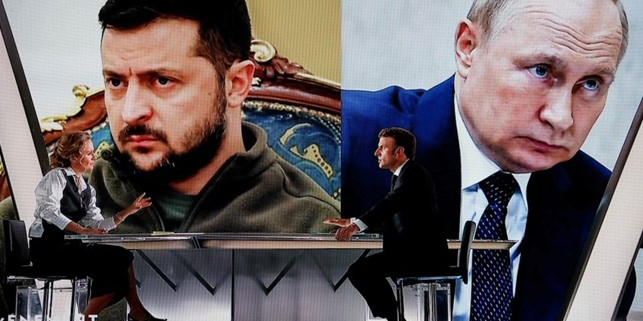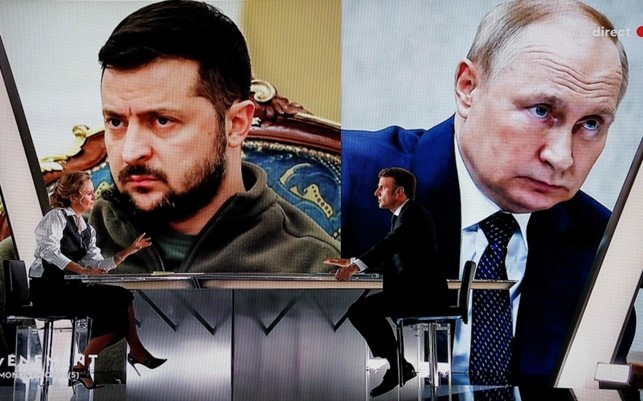
Europe Needs a Strategy for Russia After Putin
Competing ideas about the end state of the war are striving for dominance.
By Bart M. J. Szewczyk, a nonresident senior fellow at the German Marshall Fund and an adjunct professor at Sciences Po.
 French President Emmanuel Macron is interviewed by French television host Caroline Roux in Paris on Oct. 12, 2022. LUDOVIC MARIN/FRANCE TELEVISIONS/AFP VIA GETTY IMAGES
French President Emmanuel Macron is interviewed by French television host Caroline Roux in Paris on Oct. 12, 2022. LUDOVIC MARIN/FRANCE TELEVISIONS/AFP VIA GETTY IMAGES
JANUARY 20, 2023, 12:36 PM
As the defense ministers of NATO and other nations met at Ramstein Air Base in Germany, today and tried to resolve their divisions over supplying Ukraine with the heavy weapons it needs to drive Russian forces out of its territory, it’s clear that there are very different visions of the end state of the war and the region’s future. Among European countries, especially, there are stark differences about long-term policy toward Russia. There are now at least three camps of thought competing for Europe’s strategic center of gravity.
The first camp seems to believe it can turn back the clock when the war is over. Last month, German Chancellor Olaf Scholz argued that Russia should “return to the fold” after the Ukraine war and resume normal business relations with the West. In the same vein, French President Emmanuel Macron has routinely emphasized dialogue with Russian President Vladimir Putin and said he envisions a new security architecture with Moscow that would establish “guarantees to Russia”—echoing Putin’s talking point that Russia is threatened by the West, not Ukraine by Russia.
The idea behind this approach is that Putin could be rationally persuaded to recognize his mistake in waging war against Ukraine and make amends. Macron, in particular, has repeatedly tried to reason with Putin through numerous phone calls—but without any success. Europe’s economic difficulties set off by high energy prices also drive this hope for rapprochement. Paradoxically, however, this policy may prolong the conflict, as it does not resolve the underlying issues with an aggressive, revisionist Russia. And the economic argument also appears weaker now that Europe has found effective alternative supplies of gas and oil.
Any cease-fire or peace agreement with an unreconstructed Russia will be inherently unstable—only a prelude to a future conflict.
A second camp among NATO allies wants to ensure that Ukraine wins and Russian war crimes are prosecuted. The invasion’s brutality—and its fundamental challenge to an international order with respected national borders—has pushed leaders in this camp to argue for a clear Ukrainian victory in which Putin’s aggression is not rewarded and Ukraine’s sovereignty over its territory is restored. During a visit to Kyiv in late November, Polish Prime Minister Mateusz Morawiecki framed the issue starkly: either Ukraine wins or Europe loses. European Commission President Ursula von der Leyen, NATO Secretary-General Jens Stoltenberg, and various European leaders echo this view. The goal of a clear Ukrainian victory usually goes hand in hand with the desire to prosecute Russian war criminals. This week, the European Parliament voted by an overwhelming majority to create an international criminal tribunal to do exactly that.
The underlying logic here is that to restore and preserve European peace, there is no alternative to defeating Russia and prosecuting Putin and his accomplices.
A third camp, barely voiced but emerging view is that Europe will only be fully safe if Russia itself is transformed. The brutality of Russia’s war, the grandiosity of the Kremlin’s claims over neighboring countries’ territory, and the openly genocidal intent voiced by Russian leaders and propagandists have evoked historical analogies to the Nazi regime—leading some analysts to call for a fundamentally different Russia.
Whether through decentralization, democratization, or dissolution, this line of reasoning goes, Russia must change in order to prevent more wars against its neighbors. Former Polish President Lech Walesa, for example, suggested that Russia must either democratize or reduce its power in order to prevent another war in five or 10 years.
The intuition for this approach is that any cease-fire or peace agreement with an unreconstructed Russia will be inherently unstable—only a prelude to a future conflict. While fundamental change can only be driven and established internally by Russians, it can also be encouraged and supported from outside—or, at the very least, be passively supported by not standing in the way.
As the views of Scholz and Macron become increasingly isolated in Europe, the continent’s policymakers appear to be gravitating toward acknowledging the need to defeat and perhaps even transform Russia. On the one hand, it is gradually becoming apparent that Europe’s core interests in peace, prosperity, and democracy cannot be served with Putin remaining in power. Turning back the clock, therefore, no longer seems to be an option—if it ever was a realistic one in the first place. Yet even if Europe has any direct influence over Putin’s departure, recent history of regime change counsels against applying it.
The view that Russia must be defeated has become more popular with shifts in the tide of battle. The massive supply of weapons into Ukraine – predominantly by the United States, but also by Britain, Germany, Poland, and other countries—has enabled Ukraine to regain significant parts of its territory. As horrific Russian war crimes come to light in liberated towns and villages, countries such as Poland and Canada have established special prosecutor teams to investigate and collect evidence in preparation for eventual prosecution under domestic or international legal mechanisms.
This is interesting as we fully expect to see the EU changed as a result of the Ukraine war. And that change will ultimately involve the EU in drawing closer to Russia. So, WATCH this ongoing development as this current war in Ukraine is causing the EU to rethink in a way none of us would have envisioned. Europe will form a ‘Security Pact’ with Russia.
![]() This EU SUPERSTATE will along with Russia enter into a final conflict with Israel and the Middle East. Germany is the key country in what Bible Prophecy refers to as the land of “Magog”. They are spoken of militarily as the “King of the North”. Together the Bible says that Russia and the EU will invade the Middle East in the Last Days. So Bible Students expect to see Germany and France taking a greater role in leading Europe. It is also interesting to see Germany taking greater control of a continent they tried to take by war and failed.
This EU SUPERSTATE will along with Russia enter into a final conflict with Israel and the Middle East. Germany is the key country in what Bible Prophecy refers to as the land of “Magog”. They are spoken of militarily as the “King of the North”. Together the Bible says that Russia and the EU will invade the Middle East in the Last Days. So Bible Students expect to see Germany and France taking a greater role in leading Europe. It is also interesting to see Germany taking greater control of a continent they tried to take by war and failed.
Yet again we see in Today’s News Headlines words that show how the Nations are fulfilling the latter-day alignment of Nations as Prophesied by the Bible.
See this article to learn more about this and the latter day prophecies of the Bible.
See this article for more on this subject: WHAT IS NEXT FOR EUROPE
![]()
